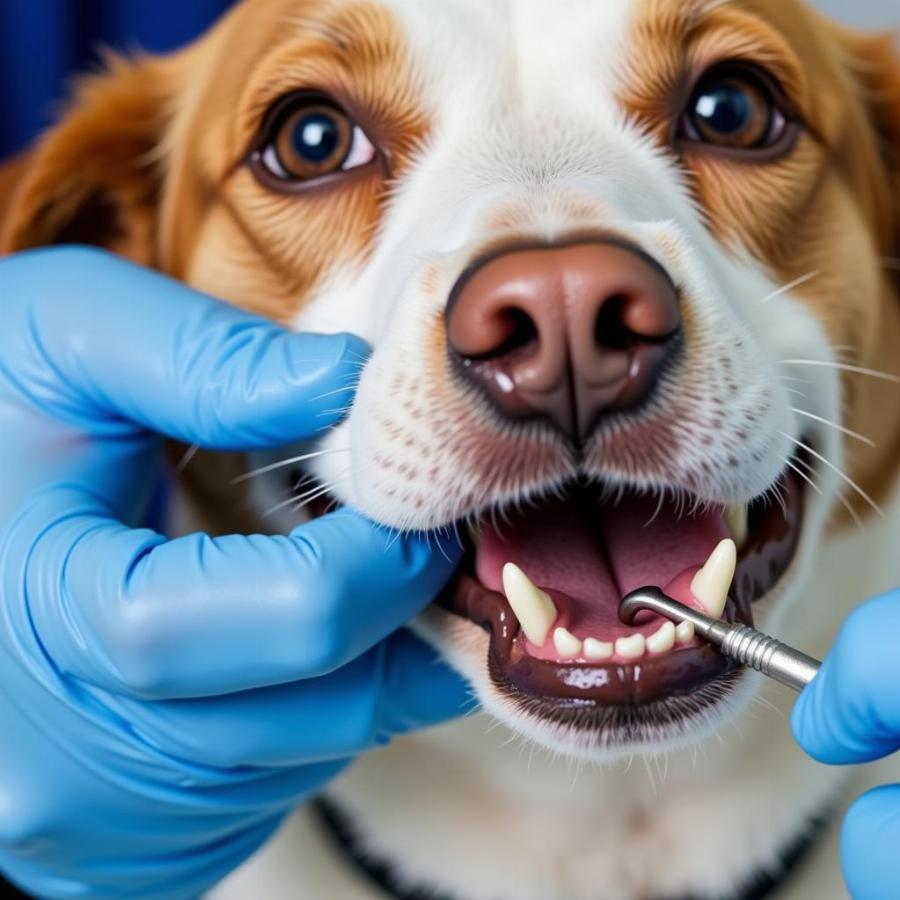A stinky situation every dog owner has encountered is that dreaded poop breath. While not always a cause for alarm, it’s certainly not pleasant, and it can sometimes signal an underlying health issue. But why exactly does your furry friend’s breath smell like feces?
This article dives into the common culprits behind your dog’s smelly breath, ways to freshen things up, and when it’s time to seek veterinary attention.
Common Causes of Poop-Scented Breath in Dogs
Several factors can contribute to your dog’s breath smelling like poop. Here are some of the most common:
-
Dietary Indiscretions: Let’s be honest, dogs explore the world with their mouths, and sometimes that includes things they shouldn’t eat. Snacking on feces (their own or from other animals – a behavior known as coprophagia), garbage, or decomposing matter can leave a lingering, unpleasant odor in their mouth.
-
Poor Dental Hygiene: Just like humans, dogs can develop plaque and tartar buildup, leading to bad breath. If left unaddressed, it can progress to periodontal disease, a serious gum infection that can cause foul breath, among other health problems.
-
Oral Health Issues: Beyond basic hygiene, other oral health issues like abscesses, tumors, or wounds in the mouth can also lead to a poop-like smell. These conditions require prompt veterinary attention.
-
Gastrointestinal Issues: Sometimes, the source of the problem isn’t the mouth but the gut. Gastrointestinal disorders like inflammatory bowel disease, food allergies, or blockages can cause breath that smells like feces.
-
Metabolic Diseases: In some cases, a metabolic disease like kidney or liver disease can be the culprit behind your dog’s bad breath. These conditions can alter the body’s metabolic processes, leading to a build-up of toxins in the bloodstream, which can manifest as bad breath.
Freshening Your Dog’s Breath: Tips and Tricks
The good news is that many cases of poop breath are preventable or treatable. Here’s how to tackle the stink:
-
Regular Dental Care: Brushing your dog’s teeth daily with a pet-safe toothpaste is crucial. Dental chews, toys, and special diets can also help reduce plaque and tartar buildup.
-
Dietary Considerations: Feeding your dog a high-quality, balanced diet is essential for their overall health, including their breath. Consider talking to your veterinarian about a diet specifically formulated for oral health.
-
Prevent Access to Poop: If your dog is prone to coprophagia, make sure to promptly clean up their waste and limit their access to other animals’ feces.
-
Regular Veterinary Checkups: Regular veterinary checkups, including oral exams, can help detect and address any underlying health issues that might be causing bad breath.
 Veterinarian Examining Dog's Teeth
Veterinarian Examining Dog's Teeth
When to Worry: Recognizing Red Flags
While occasional bad breath might be nothing to worry about, persistent poop breath warrants a trip to the veterinarian. Look out for these additional signs that could indicate a more serious problem:
- Loss of appetite
- Vomiting
- Diarrhea
- Excessive drooling
- Pawing at the mouth
- Blood in the saliva
- Swollen gums
- Loose teeth
Seeking Professional Help: Your Veterinarian is Your Ally
If your dog’s breath remains consistently foul despite implementing the tips above, or if you notice any of the red flags mentioned, don’t hesitate to consult your veterinarian. They can perform a thorough examination, including an oral exam, and recommend appropriate diagnostic tests to determine the underlying cause of the problem.
FAQs About Dog Breath
Here are some frequently asked questions about dog breath:
Q: Is it normal for my dog’s breath smells like feces?
A: While all dogs have a certain doggy odor, persistently foul breath, especially if it smells like poop, is not normal and could indicate an underlying health issue.
Q: Can I use human toothpaste on my dog?
A: No, human toothpaste often contains ingredients that are toxic to dogs, like xylitol. Always use a toothpaste specifically formulated for pets.
Q: How often should I brush my dog’s teeth?
A: Ideally, you should brush your dog’s teeth daily. However, even a few times a week can make a difference.
Q: What can I do if my dog eats poop?
A: Coprophagia can have various causes, including dietary deficiencies or behavioral issues. Consult your veterinarian to rule out any medical reasons and discuss strategies to discourage this behavior.
Need More Help?
Still have questions about why my dogs breath smells like poop or other dog-related concerns? Don’t hesitate to reach out to us at Beaut Dogs. We’re here to help you navigate the world of dog ownership and provide you with the information you need to keep your furry friend happy and healthy.
Beaut Dogs is your trusted source for everything related to dog care. We offer expert advice on a wide range of topics, from choosing the right breed to understanding your dog’s nutritional needs. Visit our website today to learn more about how to get rid of dog smell and other useful tips. When you need support, contact us at [email protected] to get detailed and accurate answers from Beaut Dogs.